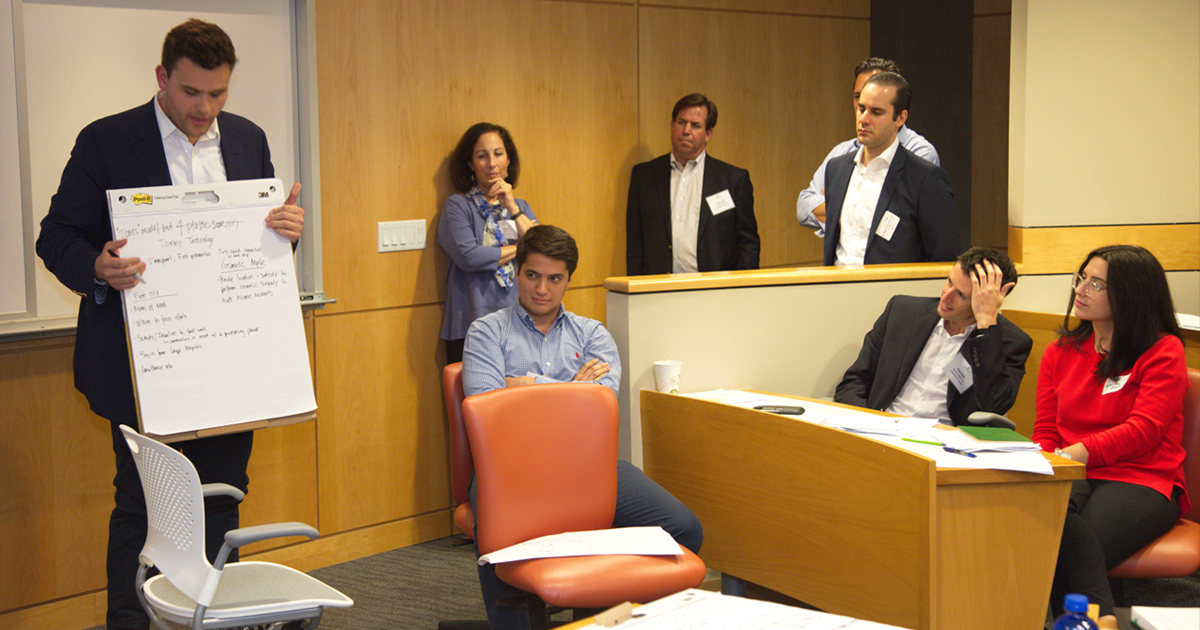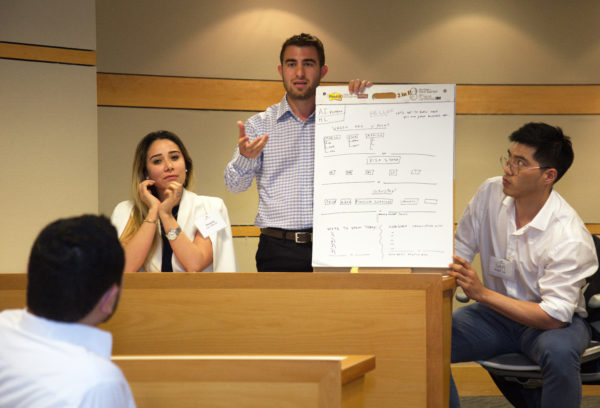MBA Students Propose Startup Solutions for City of Miami

The Babson MBA teaches students to solve problems in all areas—including how to start a new business in a large metropolitan area. This was the objective of a recent design thinking challenge on Babson’s Miami campus.
Miami is known as a popular tourism site and ranks high on the list of the best places in America to start a business. However, it has not always been rated highly for tech startups. Babson community members put their heads together during Babson Connect to help the sunny city tackle the negative perception that bureaucracy was inhibiting the launch of local startups.
In 2017, Babson opened its Miami hub, enrolling its first class of MBA students the following year. The year prior, the school launched the Women Innovating Now (WIN) Lab® Miami, a 20-spot venture accelerator for women entrepreneurs, which continues to catalyze business founders today. Immersive experiences such as these are woven throughout all of Babson’s highly rated graduate programs.
Using the Design Thinking Method
The Babson team collaborated with Miami’s Chief Innovation Officer Michael Sarasti and the Mayor’s Deputy Chief of Staff, Giovanni Castro, to bring the design thinking challenge to life. “What Miami needed was the intellectual capital and guidance to our young entrepreneurs,” said Castro. “We’re excited to have a top 10 MBA lending their talent to our startup space.”
Over 30 current and past MBA students from Babson’s campuses in Wellesley, Massachusetts, and Miami participated in this hands-on case study. But first, they needed to understand the design thinking methodology.
Babson Assistant Professor of Information Systems Ruben Mancha facilitated the exercise. He started by explaining how design thinking works: learn from the user, empathize with the audience, define the problem, brainstorm solutions, and ultimately test ideas through practical pitches.

Rather than speeding through the steps, participants are encouraged to take time sketching out a large number of sometimes radical solutions in order to solicit feedback earlier in the process. This no-holds-barred approach requires patience and a willingness to go deeper into identifying a customer’s problem before trying to solve it.
“It’s a process where you have the opportunity to say any idea is valid.” recalls MBA student and engineer Jose Darsin. “You develop the main steps and even if you don’t know if it’s feasible, you just start putting them down on paper.”
A Winning Partnership
From the city side, Castro came to the event with the goal of gaining a better perspective on the issues that Miami’s business owners were facing, as well as improving their scale-up numbers for startups. He hoped that the city’s government could be seen as a helpful collaborator rather than a hindrance. Castro credits Babson with gathering a wider group of diverse business people at the table than the city had previously been able to do.
During the challenge, students broke into small groups, identified problems and then shared their ideas with other teams to gain feedback early on. Proposed solutions included developing a city-wide incubator program that connects startups and venture capitalists in shared workspaces. Another suggestion was to simplify the administrative process of submitting paperwork and qualifying to start a business. In the end, Miami officials were very receptive to the students’ ideas.
“The City realized that we have the potential to come up with solutions quickly,” stated Mancha.
Castro called the experience a win-win: “Babson has been an amazing partner; they knocked it out of the park.”
Posted in Community




